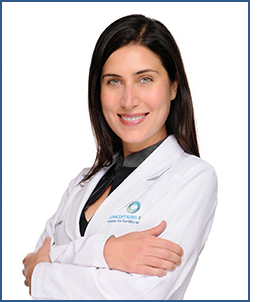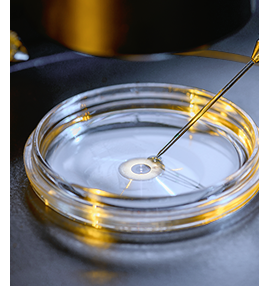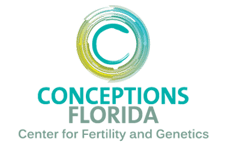When you dream about welcoming a new baby into your family, you probably imagine joyful newborn snuggles in the beautiful nursery you spent months decorating—not stressful months waiting in a Neonatal Intensive Care Unit (NICU), until your baby is healthy enough to bring home. If you’re considering gestational surrogacy using in vitro fertilization (IVF), one easy way to reduce risks of premature labor, birth defects and developmental problems is to follow the American Society for Reproductive Medicine (ASRM)’s recommendation of transferring only one embryo. While these risks are present with every pregnancy, they are significantly higher with multiples.
 To learn more about why single embryo transfer is now the recommended approach for all patients below the age of 37, we spoke with Sinem Karipcin, MD, FACOG, Board Certified Fertility Specialist at Conceptions Florida Center for Fertility and Genetics.
To learn more about why single embryo transfer is now the recommended approach for all patients below the age of 37, we spoke with Sinem Karipcin, MD, FACOG, Board Certified Fertility Specialist at Conceptions Florida Center for Fertility and Genetics.
“When there is a transfer of multiple embryos, the risks are increased in virtually every pregnancy complication across the board, including preterm labor, C-section delivery, pregnancy hypertension, gestational diabetes and blood clots,” Dr. Karipcin said. “When using a gestational surrogate, transferring more than one embryo at a time puts the surrogate at risk of having all these complications. But also, it increases risks for the children.”
In the United States, the preterm delivery rate in twins is 59 percent before 37 completed weeks of gestation and 11 percent before 32 completed weeks. Preterm infants may have cerebral palsy, resulting in intellectual or developmental disability, underdeveloped lungs, which can cause respiratory problems, or an underdeveloped digestive system, which can cause gastrointestinal problems.
“Fortunately, most of these children will recover from health problems associated with preterm labor, thanks to current technology—but there are certainly children who suffer as a result,” Dr. Karipcin explained. “There are financial consequences as well. Parents could end up with huge hospital bills because of NICU stays or pregnancy complications with the surrogate.”
 Especially, if the embryos are tested for chromosomal balance (pre-implantation genetic testing for aneuploidy), there is no excuse for transferring more than one embryo. BEST trial, published by Eric Forman in 2013, demonstrated the superiority of single embryo transfers. The study compared the transfer of a single chromosomally balanced embryo to the transfer of two untested embryos. The ongoing pregnancy rate was the same. However, the multiple pregnancy rate was 50% in the double embryo transfer group.
Especially, if the embryos are tested for chromosomal balance (pre-implantation genetic testing for aneuploidy), there is no excuse for transferring more than one embryo. BEST trial, published by Eric Forman in 2013, demonstrated the superiority of single embryo transfers. The study compared the transfer of a single chromosomally balanced embryo to the transfer of two untested embryos. The ongoing pregnancy rate was the same. However, the multiple pregnancy rate was 50% in the double embryo transfer group.
“In my clinic, when the source of the egg is a woman younger than 35, the ongoing pregnancy rate is higher than 60% with single embryo transfer, with or without aneuploidy testing,” Dr. Karipcin said. “When the young moms ask about the possibility of multiples with untested embryos, I tell them expect to 50%.”
Dr. Karipcin also notes that transferring two embryos does not necessarily mean two babies. An embryo could split and make an identical twin, so intended parents could end up with triplets—or even quadruplets.
 While Dr. Karipcin is a strong advocate for single embryo transfer, she acknowledges that ultimately, the decision is up to patients. When patients request a transfer that is outside the ASRM guidelines, she refers them to a maternal fetal medicine specialist, who provides additional counseling about the risks of multiples. Most patients choose single embryo transfer when they return.
While Dr. Karipcin is a strong advocate for single embryo transfer, she acknowledges that ultimately, the decision is up to patients. When patients request a transfer that is outside the ASRM guidelines, she refers them to a maternal fetal medicine specialist, who provides additional counseling about the risks of multiples. Most patients choose single embryo transfer when they return.
“If the goal is to have a live, healthy birth, let’s not lose sight of how to get there,” Dr. Karipcin said. “There are fewer complications for all parties when it is a singleton pregnancy.”
In addition to being an exceptional clinician, Dr. Karipcin has also led a number of original studies to optimize IVF protocols at Harvard and Cornell, and conducts ongoing research in the field of pre-implantation genetic testing.
Are you interested in gestational surrogacy?
Newborn Advantage partners with industry experts like Dr. Karipcin, and fertility centers like Conceptions Florida, across the country. Contact us today to find out more about gestational surrogacy.
Connect with Conceptions Florida
Conceptions Florida specializes in vitro fertilization, genetic testing, surrogacy, egg freezing (cryopreservation), and egg and sperm donation. Learn more at www.conceptionsflorida.com



